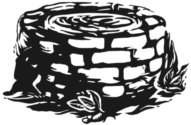Issue 4.2
February 2026
In This Issue:
Lanterns in the Alley
David Anson Lee
Crow Poem
Paul Jaskunas
Anyone Who Disagrees Is an Idiot
Casey Ferguson
Facing It
Neal Mason
Leaving the Club
Paul Jaskunas
David Anson Lee
Lanterns in the Alley
Lanterns in the Alley
They hang low, strung between bricks
like captured stars,
flickering against damp walls.
I walk beneath them, counting shadows
stretching across wet stones.
Each lantern hums a story:
laughter abandoned in July,
a whispered apology pressed to a hand,
a knife of moonlight splitting fog.
I, a stranger to all of it,
carry the weight of unseen footsteps
in my chest,
learning how light bends
before it breaks.
Paul Jaskunas
Crow Poem
Crow Poem
So sure of themselves, these big crows.
Their loud queries carry through sky
like fierce commands they somehow know
their ready god cannot deny.
As for me, I can barely walk
around the park in such thick fog,
much less summon the nerve to talk
of meek or bold demands for god.
Then again, what is this new day
but a question asking, again,
by its answering: *come what may.*
Be like a crow: belt the refrain.
Casey Ferguson
Anyone Who Disagrees Is an Idiot
Anyone Who Disagrees Is an Idiot
*“Contra si quis sentiat, nihil sentiat.”*
Sing to me Muses, tell me of the fame
of that critic, endowed beyond his peers,
Volcacius Sedigitus by name,
who numbered on six fingers passing years.
If Sir Sedigitus were living yet,
he’d be a circus freak; or seek his pay
with concerts on piano—I admit
ovations, well-earned, might just come his way.
His fragments are not much, for what it’s worth,
though Fontanus and Malcolm praise him fair
and think today to give him second birth
by publishing in journals odd and rare.
“All fame is fleeting:" it’s true of this Roman
of whom near all we know is his cognomen.
Neal Mason
Facing It
Facing It
Trying to decide between doubt and belief,
as though common sense were something I’d
forgotten, I began shaving away
at cults by employing the razor
patented by Ockham.
Various candidates—climate, gender,
medieval thinking—were, and weren’t, a bare-faced
lie, fanatical bearded prophets
selling blunt clippers
the gullible buy.
Not relying on an afterlife
or traditional God, I lauded Christian atheism
and art. Thinking in fashion and gadgetry
I rejected, especially
if praised as ‘smart.’
In Western culture, Christian submission
became exploited weakness, fear of offending
a farce. I looked to mirror Nietzsche,
though I wish he’d shaved off
that awful moustache.
Logos, away from shaggy faith,
serves as a precision tool, thought’s analytical
laser; but, handled poorly,
proves more deadly
than a cut-throat razor.
Ugly causes, secular or religious,
appeared presentable, though less attractive than
they seem. Beware, for instance, chinless
wonders intensely purveying
a utopian dream.
Belief is the way we act, not look.
Facial expressions accord with deeds and how
we behave; a food-encrusted beard
cries out for a barber
and Ockham’s aftershave.
Paul Jaskunas
Leaving the Club
Leaving the Club
Now that the band has freed and swung all notes
imaginable from their drums, guitar and organ keys,
we leave the club, the jazz still shimmering
in our soft ears. Outside the silence welcomes us,
embalms the music, holds its shape with gentleness.
We huddle close on the curb. I kiss your mouth
or not, as you might wish, or not, and nothing
is not ripe with unheard sound in quiet such as this.
To dwell inside extinguished song, to touch
the touchless night, and sense the chords
we know are there amassing in the air
is what this hour’s for—to feel, to want
but not yet hold what holds us tight
as tombs encase the dark and loss embraces loss.
